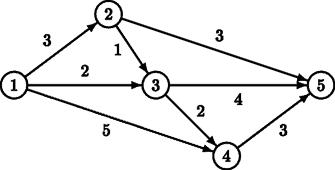Sightseeing
Time Limit: 3000/1000 MS
(Java/Others) Memory Limit: 32768/32768 K
(Java/Others)
Total Submission(s): 639 Accepted
Submission(s): 249
Problem Description
Tour operator Your Personal Holiday organises guided
bus trips across the Benelux. Every day the bus moves from one city S to another
city F. On this way, the tourists in the bus can see the sights alongside the
route travelled. Moreover, the bus makes a number of stops (zero or more) at
some beautiful cities, where the tourists get out to see the local
sights.
Different groups of tourists may have different preferences for
the sights they want to see, and thus for the route to be taken from S to F.
Therefore, Your Personal Holiday wants to offer its clients a choice from many
different routes. As hotels have been booked in advance, the starting city S and
the final city F, though, are fixed. Two routes from S to F are considered
different if there is at least one road from a city A to a city B which is part
of one route, but not of the other route.
There is a restriction on the
routes that the tourists may choose from. To leave enough time for the
sightseeing at the stops (and to avoid using too much fuel), the bus has to take
a short route from S to F. It has to be either a route with minimal distance, or
a route which is one distance unit longer than the minimal distance. Indeed, by
allowing routes that are one distance unit longer, the tourists may have more
choice than by restricting them to exactly the minimal routes. This enhances the
impression of a personal holiday.

For
example, for the above road map, there are two minimal routes from S = 1 to F =
5: 1 → 2 → 5 and 1 → 3 → 5, both of length 6. There is one route that is one
distance unit longer: 1 → 3 → 4 → 5, of length 7.
Now, given a (partial)
road map of the Benelux and two cities S and F, tour operator Your Personal
Holiday likes to know how many different routes it can offer to its clients,
under the above restriction on the route length.
Input
The first line of the input file contains a single
number: the number of test cases to follow. Each test case has the following
format:
One line with two integers N and M, separated by a single space,
with 2 ≤ N ≤ 1,000 and 1 ≤ M ≤ 10, 000: the number of cities and the number of
roads in the road map.
M lines, each with three integers A, B and L,
separated by single spaces, with 1 ≤ A, B ≤ N, A ≠ B and 1 ≤ L ≤ 1,000,
describing a road from city A to city B with length L.
The roads are
unidirectional. Hence, if there is a road from A to B, then there is not
necessarily also a road from B to A. There may be different roads from a city A
to a city B.
One line with two integers S and F, separated by a single
space, with 1 ≤ S, F ≤ N and S ≠ F: the starting city and the final city of the
route.
There will be at least one route from S to F.
Output
For every test case in the input file, the output
should contain a single number, on a single line: the number of routes of
minimal length or one distance unit longer. Test cases are such, that this
number is at most 10^9 = 1,000,000,000.
Sample Input
2
5 8
1 2 3
1 3 2
1 4 5
2 3 1
2 5 3
3 4 2
3 5 4
4 5 3
1 5
5 6
2 3 1
3 2 1
3 1 10
4 5 2
5 2 7
5 2 7
4 1
Sample Output
Source
Recommend
lcy | We have
carefully selected several similar problems for you:
2833 2433 2363 2482 2377
题意就是 求最短路径数和比最短路径大1的路径数的和。
和3191几乎一样+ +自己写了一下次短路,结果wa了好多次...不过这种解法效率真的很高!

1 //15MS 528K 2372 B C++
2 #include<iostream>
3 #include<queue>
4 #include<vector>
5 #define inf 0x3fffffff
6 #define N 1005
7 using namespace std;
8 struct edge{
9 int v,w;
10 edge(int a,int b){
11 v=a;w=b;
12 }
13 };
14 struct node{
15 int v,w;
16 int mark;
17 bool operator < (const node &p) const{
18 return p.w<w;
19 //return p.v<v;
20 }
21 };
22 vector<edge>V[N];
23 int n,m,s,e;
24 int d[N][3];
25 int dp[N][3];
26 int vis[N][3];
27 void dijkstra(int s)
28 {
29 for(int i=0;i<=n;i++)
30 d[i][1]=d[i][2]=inf;
31 memset(dp,0,sizeof(dp));
32 memset(vis,0,sizeof(vis));
33 priority_queue<node>Q;
34 node p,q;
35 d[s][1]=0;
36 dp[s][1]=1;
37 p.w=0,p.mark=1,p.v=s;
38 Q.push(p);
39 while(!Q.empty()){
40 p=Q.top();
41 Q.pop();
42 if(vis[p.v][p.mark]) continue;
43 vis[p.v][p.mark]=1;
44 int m=V[p.v].size();
45 for(int i=0;i<m;i++){
46 int v=V[p.v][i].v;
47 int w=V[p.v][i].w;
48 if(!vis[v][1] && d[v][1]>p.w+w){
49 if(d[v][1]!=inf){
50 d[v][2]=d[v][1];
51 dp[v][2]=dp[v][1];
52 q.v=v,q.mark=2,q.w=d[v][2];
53 Q.push(q);
54 }
55 d[v][1]=p.w+w;
56 dp[v][1]=dp[p.v][p.mark];
57 q.v=v,q.mark=1,q.w=d[v][1];
58 Q.push(q);
59 }else if(!vis[v][1] && d[v][1]==p.w+w){
60 dp[v][1]+=dp[p.v][p.mark];
61 }else if(!vis[v][2] && d[v][2]>p.w+w){
62 d[v][2]=p.w+w;
63 dp[v][2]=dp[p.v][p.mark];
64 q.v=v,q.mark=2,q.w=d[v][2];
65 Q.push(q);
66 }else if(!vis[v][2] && d[v][2]==p.w+w){
67 dp[v][2]+=dp[p.v][p.mark];
68 }
69 }
70 }
71 }
72 int main(void)
73 {
74 int u,v,w;
75 int t;
76 scanf("%d",&t);
77 while(t--)
78 {
79 scanf("%d%d",&n,&m);
80 for(int i=0;i<=n;i++)
81 V[i].clear();
82 for(int i=0;i<m;i++){
83 scanf("%d%d%d",&u,&v,&w);
84 V[u].push_back(edge(v,w));
85 //V[v].push_back(edge(u,w));
86 }
87 scanf("%d%d",&s,&e);
88 dijkstra(s);
89 int ans=dp[e][1];
90 //printf("*%d %d %d\n",ans,d[e][1],d[e][2]);
91 if(d[e][2]==d[e][1]+1) ans+=dp[e][2];
92 printf("%d\n",ans);
93 }
94 return 0;
95 }

hdu 1688 Sightseeing (最短路径),布布扣,bubuko.com
hdu 1688 Sightseeing (最短路径)
原文:http://www.cnblogs.com/GO-NO-1/p/3739645.html
